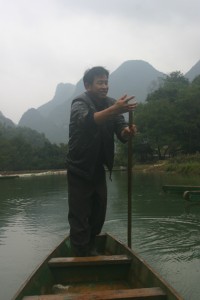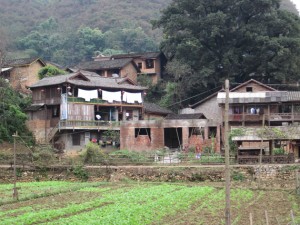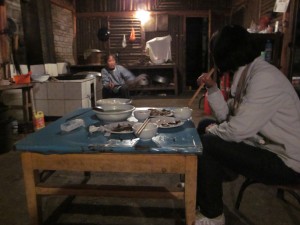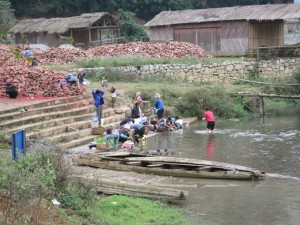
There is something inherently voyeuristic in my desire for close encounters with rural Yunnan. Chinese villages are a world apart from Chinese cities, and the old aphorism of being a great place to visit, but I wouldn’t want to live there applies.
In the lumpy-bumpy karst mountain region a few hundred kilometers east of Kunming lies a unique valley harboring a typical village, Bamei. The village is populated by people of the Zhuang ethnic group, and sufficiently isolated from the outside world as to retain some primordial character. A crystal clear stream runs along the valley floor, with fields spread on either side, and the structures comprising the village arrayed up on the mountain side so as to maximize tillable land.
It’s late November, and some of the fields are newly plowed, clayey soil turned by ox drawn plows. Others still bear the color of late-season vegetable crops, punctuated by human figures harvesting the greenery into baskets suspended on shoulder poles for self or animal consumption. The weather is drizzly; mud prevails.
I sit on the dining deck of an otherwise deserted guest house and survey the enclosing karst ridges. Remarkable is

that I see no break in the ring which might provide the river with ingress and egress.
[That last paragraph is for literary effect. I know the course of the river very well, because I followed it to get here.]
Indeed, there is no break. The river simply goes underground, flowing through perhaps two kilometers of cavern before it emerges on the far side of the mountain. Thus to enter Bamei from the outside world you engage the services of a Zhuang boatman, who poles you upstream until, out of the dark bowels of the earth, you break forth into a hidden valley. As you continue upstream, the river pulls this sleight-of-hand twice more. After traversing the next cavern, you enter a narrower valley, with no settlements, just a few animal sheds, fish weirs, duck ponds and fields. Finally another, longer disappearing act, and the boat re-emerges into the outskirts of a larger village, firmly in the grip of civilization.
Truly, a magical, hidden valley.

There are consequences to this isolation. No roads penetrate the valley, hence no motorized traffic, none of the cars, trucks, buses, with their incessant honking, as everywhere else in China. No roads at all. My Chinese guide, brought up in the local Chinese dialect, is deaf to the Zhuang language, and strains to communicate in the natives’ Chinese-as-a-second-language. (Forget English.) The food served up by our hostess is local produce: eggs from the chickens and ducks, veggies from her several garden plots, still green in November, various squashes and tubers, fried minnows from the river, bits of pork belly. All helped down with rice wine, home-brewed out of the eye of revenuers.
Our rooms are of new construction, filling out two sides of a courtyard, the other two sides of which are of more

traditional, sapling-log structures. The rooms are comfortable, not by the multi-starred standards of the hospitality industry, but by any reasonable standard of human need. Being the off-season, we are the only guests, and our hostess walks us through the living menu of her vegetable garden: just point out what you would like for dinner. We eat together with her in the kitchen on a low table, under a bare bulb, next to the wood-fired stove with its embedded woks. The space is shared by a cat adapted to scrounging the inedible bits spit out on the floor, with the help of an occasional chicken, while the family pig serenades us from beyond the log wall, offering a comforting aid to digestion and oblivious to the likelihood that his belly will be next up in the wok.

We spend a morning making out way up-river, by foot and by boat. We spend an afternoon traipsing along the narrow dikes which typically separate Chinese fields and paddies. My guide is a country girl, well versed in the names of crops and techniques, somewhat more sure-footed, and consequently a little less muddied, than I. In the evening we watch, from a good distance (because my guide is also superstitious), a funeral “service”, replete with fire-crackers, ritual dances, chants, horns (suona), tambourines — the participants all cloaked in white.
Truly idyllic?
Bamei indeed seems free of most of the urban iniquities you and I thrive on. With the exception of television.

While the life-giving river enters the hidden valley through subterranean channels, life-polluting CCTV enters on supraterranean beams. That television breaks the spell of pristine Zhuang culture is obvious and inevitable; that it breaks the drudgery of the villagers’ hard-scrabble existence is arguably commendable.
For Bamei’s fields are not Elysian. The work is hard, long, muddy, and manual, with only animal-power to alleviate the worst of it. The question becomes not would I want to live there, but would I be able to survive there? Probably not. Better just pass by as city-slicking voyeur with a few city-made Yuan in my pocket.
One response to “Magical Valley”
Bob ,you are a good writer.